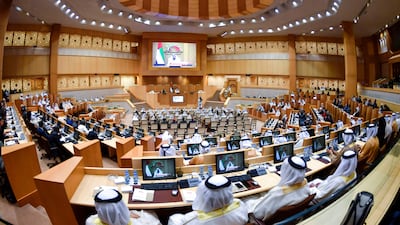The 16th Federal National Council began its third session earlier this week, in what is its 45th anniversary year. Established in February 1972, the council has the right to review draft federal laws and offer recommendations to the Cabinet. It is also able to question ministers on the performance of their portfolios and scrutinise the country's annual budget.
More than that, it reflects the conversations and the currents that flow through the nation. One only has to look at the expansive range of issues at the top of the FNC's agenda this week – artificial intelligence, youth empowerment, failed marriages, unemployment and the cost of living – to see that its view is broad and its appetite for addressing the needs of citizens is not easily sated.
Clearly then, the council is concerned with the issues of today as well as the challenges of tomorrow, as, indeed, you might expect a political chamber of this nature to be.
But there is also something rare about the FNC. The grandeur of the chamber should not blind one from the council’s key role as a voice of the people. While it may be a stretch to say the chamber replicates the work of the traditional social system of the majlis, it does bring the concerns of citizens to greater public attention and affords these issues a place to be discussed at length. Some of those conversations lead to proposed revisions of the law, some bring about new ways at looking at old problems.
Either way, the FNC matters for its role as a scrutineer and its ability to act as a representative of the people, as witnessed by the domestic workers law, which passed through the council in the last session. We will follow the work of the FNC with interest in this session, as it continues with its mission of engagement, debate and discussion.
